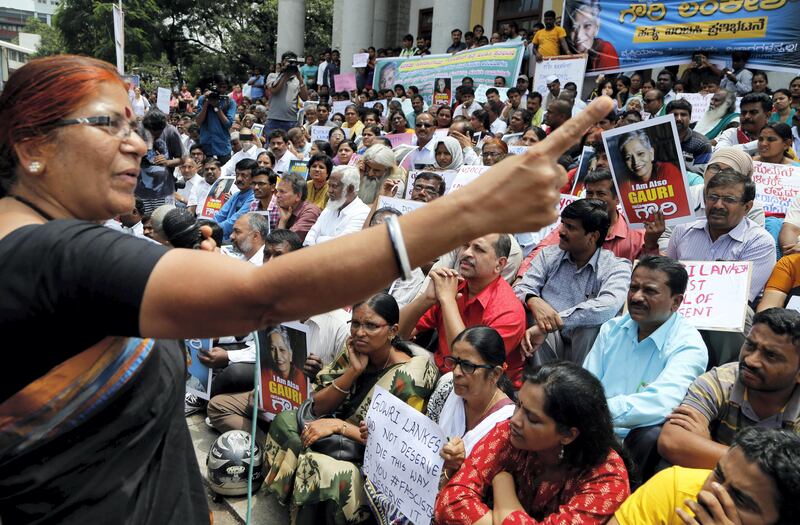Scores of protesters filled the front steps of Bengaluru’s town hall on Wednesday, in condemnation of the murder of Gauri Lankesh, a journalist and activist who was shot dead the previous evening.
Lankesh, a prominent critic of the right-wing Hinduism espoused by prime minister Narendra Modi’s Bharatiya Janata Party (BJP), was found lying in a pool of blood just outside her house. She had been shot three times, in her head and chest, by unknown attackers who may have been waiting for her to return home.
The murder is the latest in a string of killings of writers and activists who have spoken out stridently against Hindutva, or Hindu nationalism.
At the Bengaluru protest, and at others that occurred through the day in other Indian cities, demonstrators held up signs that memorialised the previously slain: Narendra Dhabolkar, a rationalist who was killed by gunmen in August 2013; Govind Pansare, a Marathi writer who was shot dead in February 2015; M M Kalburgi, a Kannada writer who was shot at home in August 2015.
Although police have made arrests in the murder investigations of Dhabolkar and Kalburgi, the trials of suspects have not yet begun.
“There are similarities between Kalburgi and Gauri Lankesh’s murder,” T B Jayachandra, Karnataka’s law minister, said on Wednesday. “She was always committed to secular credentials. There must be some conspiracy behind this.”
“Her killing is an ominous portent for dissent in democracy and a brutal assault on the freedom of the press,” said a statement from the Editors Guild of India.
Lankesh, who was 55 years old, was the daughter of P Lankesh, a poet and writer who started Lankesh Patrike, an independent Kannada newspaper, in 1980. After her father's death in 2000, his newspaper was taken over by Lankesh's brother, so she started her own weekly, Gauri Lankesh Patrike.
She had already worked for major Indian publications, including the Times of India and India Today. In her own paper and stories elsewhere, she criticised Hindutva, the BJP's "fascist and communal politics" as well as the Hindu caste-system.
In 2008, Lankesh published an article alleging that a BJP parliamentarian was involved in criminal activity. Last November, after a lengthy trial, she was convicted for defamation but released on bail pending appeal to a higher court.
“In Karnataka today, we are living in such times that Modi [followers] and the Hindutva brigade welcome the killings … of those who oppose their ideology, their political party and their supreme leader,” Lankesh told the Newslaundry website after the verdict last November. “Let me assure you, they are keen to somehow shut me up too.”
The verdict against Lankesh invoked a warning on Twitter from Amit Malviya, the head of the BJP’s information technology cell. “Hope other journos take note,” Mr Malviya tweeted at the time.
__________________
Read more:
India journalist gunned down outside her home
What a small-town printing press says about Hindu nationalism today
In India, writers protest over ‘rising intolerance’
__________________
Prem Panicker, a Bengaluru-based editor and writer, did not know Lankesh very well, but he followed her work closely when he started his journalism career. He disagreed with her views sometimes, but never ceased to admire her convictions, he said.
Panicker criticised the “dangerous rhetoric of those in power” who in turn influence their followers into acts of violence. They “believe they are serving the cause of their ‘leaders’ and of the country itself when they lynch, and burn, and pump bullets into those who dare differ”.
Lankesh’s murder fits into a larger pattern of intimidation faced by Indian journalists who criticise Mr Modi or his party. Abuse and threats of violence on social media are rampant.
A report published in April by an Indian media watchdog The Hoot showed that 54 physical attacks on journalists in India had been recorded over the previous 16 months.
“The data … shows that lawmakers and law-enforcers are the prime culprits in the attacks and threats on the media,” the report said. “We need to call out the complicity of political party leaders and politicians’ supporters.”
Reporters without Borders, which tracks the safety of journalists working across the world, has ranked India 136th out of 180 countries in the 2017 World Press Freedom Index.
“With Hindu nationalists trying to purge all manifestations of ‘anti-national’ thought from the national debate, self-censorship is growing in the mainstream media,” the group said.





